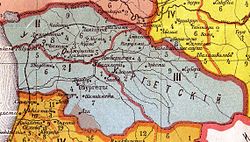
Back الجمهورية الغوريانية Arabic Quriya Respublikası Azerbaijani República de Guriana Catalan Gurische Republik German République de Gourie French הרפובליקה של גוריה HE გურიის რესპუბლიკა Georgian Гурийская республика Russian Guria Cumhuriyeti Turkish 古里亚共和国 Chinese
Gurian Republic გურიის რესპუბლიკა | |
|---|---|
| 1902–1906 | |
 | |
| Capital | Ozurgeti |
| Common languages | Georgian |
| Government | Republic |
| President | |
• 1902–1906 | Beniamin Chkhikvishvili |
| Historical era | Modern Era |
• Sovereignty | 1902 |
• Disestablished | 1906 |
| Currency | Ruble |
| Today part of | Georgia |
The Gurian Republic[a] was an insurgent community that existed between 1902 and 1906 in the western Georgian region of Guria (known at the time as the Ozurget Uyezd) in the Russian Empire. It rose from a revolt over land grazing rights in 1902. Several issues over the previous decades affecting the peasant population including taxation, land ownership and economic factors also factored into the start of the insurrection. The revolt gained further traction through the efforts of Georgian social democrats, despite some reservations within their party over supporting a peasant movement, and grew further during the 1905 Russian Revolution.
During its existence, the Gurian Republic ignored Russian authority and established its own system of government, which consisted of assemblies of villagers meeting and discussing issues. A unique form of justice, where trial attendees voted on sentences, was introduced. While the movement broke from imperial administration, it was not anti-Russian, desiring to remain within the Empire.
The 1905 Russian Revolution led to massive uprisings throughout the Empire, including Georgia, and in reaction the Russian imperial authorities deployed military forces to end the rebellions, including in Guria. The organised peasants were able to fend off a small force of Cossacks, but the imperial authorities returned with overwhelming military force to re-assert control in 1906. Some of the Republic's leaders were executed, imprisoned or exiled, but others later played prominent roles in the 1918–1921 Democratic Republic of Georgia. The Republic also showed that peasants could be incorporated into the socialist movement, an idea previously downplayed by leading Marxists.
- ^ Mchedishvili 2012
- ^ Shanin 1997, p. 180
Cite error: There are <ref group=lower-alpha> tags or {{efn}} templates on this page, but the references will not show without a {{reflist|group=lower-alpha}} template or {{notelist}} template (see the help page).